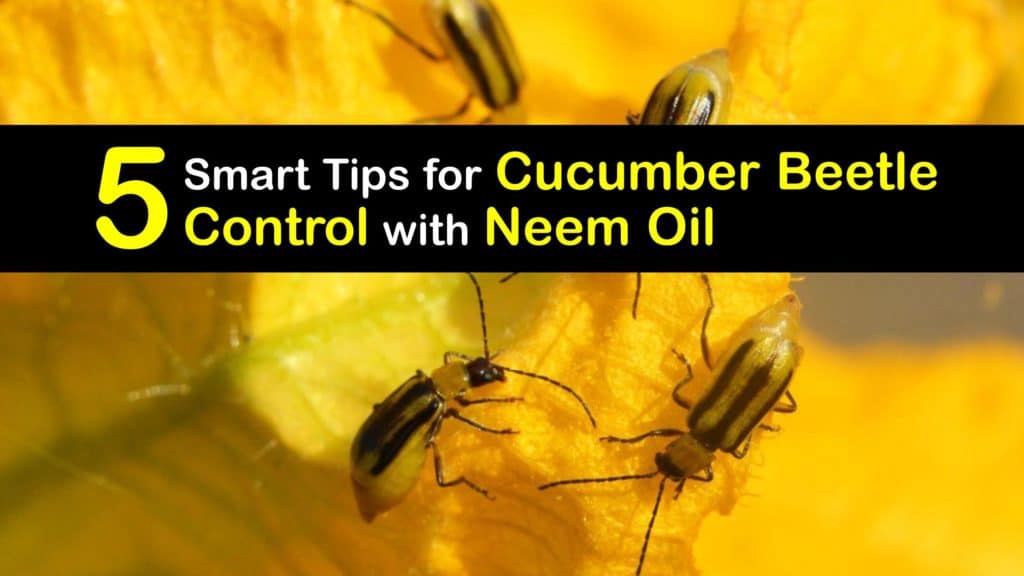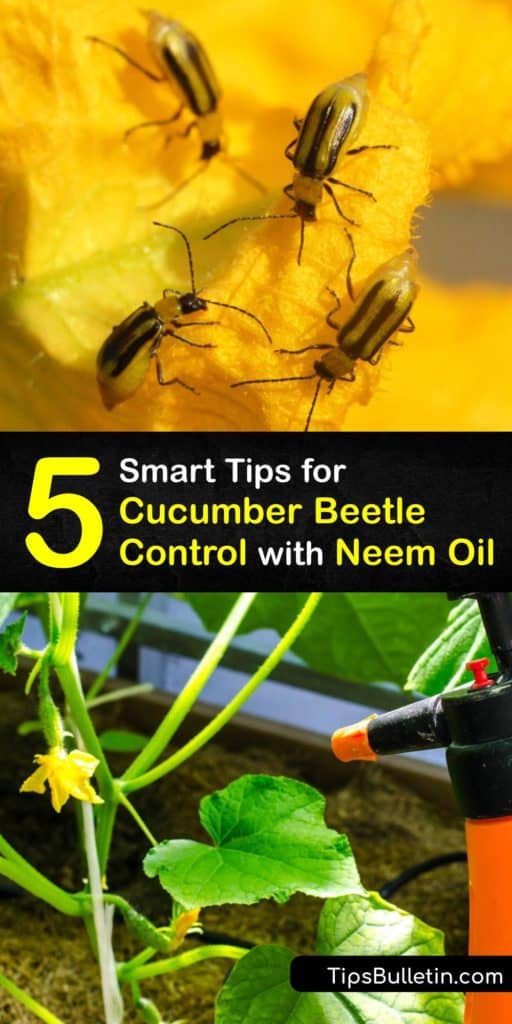Cucumber beetles feed on and damage cucurbit plants when left unattended in the garden. While you can pick cucumber beetles off your plants, you may need a natural insecticide to prevent cucumber beetle damage in severe cases. Learn how to use neem oil for cucumber beetles to save your cucumber plant from a preventable infestation.
The name cucumber beetle identifies two types of beetles due to their habit of feeding on cucurbit crops like cucumbers and squash. These insects feed on the leaves of young plants and the buds and petals of mature plants. Cucumber beetle larvae are known to burrow into the soil below your plant to feed on its roots.
After feeding, adult cucumber beetles lay eggs on plant leaves, leading to an infestation of corn rootworms that grow into striped or spotted cucumber beetles. Aside from the damage beetles cause, adult beetles are vectors for diseases like bacterial wilt and the cucumber mosaic virus.

Can You Use Neem Oil to Repel Cucumber Beetles?
Learning to effectively use a natural insecticide to control the cucumber beetle population in your garden is essential for integrated pest management. The best source of neem oil comes from the seeds of the host tree, which is native to South Asia and India.
The oil has versatile uses as a pesticide; neem oil does work great on squash bugs, too. It prevents larvae from maturing into adults, causes pests to cease feeding, and coats insects to prevent them from breathing when applied directly. Its bitter taste and smell work well for repelling various insects in the garden.
How to Use Neem Oil for Cucumber Beetles in the Soil
Although neem oil is most commonly applied externally to plants to kill and repel pests, neem oil is effective when used as a soil drench treatment. This process involves pouring neem oil into your garden soil and allowing your plant’s roots to absorb it.

Neem oil works inside your plant as a systemic insecticide and is beneficial because it targets insects that pierce or chew on the plant’s vines and leaves, like squash vine borers, and flea beetles. The proper use of neem oil helps controlling cabbage worms and a variety of other pests, as well.
To prepare your soak, emulsify your water with dish soap to break the surface tension to allow it to mix with oil. Pour your cold-pressed neem oil into the water and mix well. Use two to three cups of your soak around each host plant for your target pests. Reapply this soak every two weeks and watch as the number of pests drops.
This treatment is helpful for all your veggies. Neem oil is safe for tomato plants and other edibles so you don’t have to worry about harmful side effects.
Cucumber Beetle Control with Neem Oil Traps
Cucumber beetles, like squash bugs and Japanese beetles, are drawn to the color yellow because it mimics the color of flowers. Many commercial pest control traps use a yellow piece of plastic or paper as a base for the adhesive in sticky traps.
To create your own, use a similar piece of material with neem oil and a sticky substance to trap and kill insect pests.
Coat a piece of yellow paper or plastic with neem oil and the adhesive of your choice. Good options include honey, Vaseline, or glue that doesn’t dry. Stick this paper in the garden around the base of your plants to trap and kill garden pests.
DIY Neem Oil Insecticide
The best form of proactive cucumber beetle control with neem oil is to create a neem oil spray for your garden. A foliar spray is effective against spotted and striped cucumber beetles and other pests like Colorado potato beetles. Regular treatment with neem oil is ideal for keeping insects away and killing insects on your plants.
To spray neem oil to deter squash bugs and cucumber beetles, mix your water and dish soap in the sprayer to create a soapy solution, then pour your neem oil into the sprayer and mix well. Spray your plant, including the tops and bottoms of leaves; it helps controlling a zucchini bug infestation and aphids, too.
Controlling Cucumber Beetles with Trap Crops and Neem Oil
One method for controlling the number of cucumber beetles in your garden is to use a combination of trap crops with insecticides to deter and kill garden pests.
Radishes are an excellent trap crop because of how quickly they grow, and their roots help break up the soil for nearby plants. If you’re growing cucurbit plants, add Blue Hubbard squash to draw cucumber beetles.
To ensure garden pests leave your favorite plants alone, consider treating your trap crop with a neem oil insecticide to kill insects that feed on your trap crop instead.
Using Neem Oil to Deal with Cucumber Beetle Eggs
Dealing with adult cucumber beetles is only part of the issue when trying to keep your garden free of pests and dealing with common cucumber plant problems. After feeding, adult beetles lay their eggs on the underside of plant leaves. If you’re only targeting cucumber beetles that you see, you’re not preventing the next generation of beetles from hatching.
Aside from using neem oil to repel cucumber beetles, it will kill cucumber beetles at any stage of life. If you perform regular garden maintenance, bring a bucket of soapy water with neem oil mixed in along with you.
Check the bottom of the leaves, where the leaf veins come together to form a V for egg clusters. Brush these eggs off into your soapy water to kill them.
Neem Oil and Beneficial Insects
Whether you use neem oil as a foliar spray or as a systemic insecticide, the concern over the oil’s effect on beneficial insects should be considered. Many plants rely on beneficial insects like bees and soldier beetles to distribute pollen and allow pollination. Other beneficial insects include natural predators for cucumber beetles.
Unlike insecticides like bacillus thuringiensis, neem oil is harmful if misused. Bees, like any insect, are susceptible to having their airways clogged if sprayed directly with neem oil.
Additionally, if you spray a flowering plant and a bee visits the plant immediately afterward, the primary ingredient in neem oil, Azadirachtin, enters the bee’s body. This ingredient does not kill worker bees but may cause the queen bee to die once the bee reaches the colony.
To avoid harming beneficial insects, use insecticides like neem oil at dusk or dawn to avoid the activity period of beneficial insects. If there are beehives nearby or flowering plants that bees visit often, avoid spraying these plants to avoid the wind carrying droplets to the bees.
Does neem oil kill cucumber beetles? Yes, not only does using neem oil to repel cucumber beetles work, the proper application of neem oil fatally affects many other pests. Neem oil treatments also effectively treat other problems like powdery mildew and leaf spot due to their anti-fungal properties.

If you learned how to use neem oil for cucumber beetles in your garden, please share our tips for cucumber beetle control with neem oil with your fellow gardeners on Facebook and Pinterest.